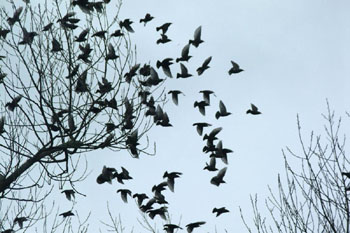
When I was many years younger, I used to be hit hard by what later came to be known as SAD – Seasonal Affective Disorder. As Autumn proceeded from its kaleidoscopic colors into rusts and browns, and finally into Winter’s endless grays, my own spirits would slump accordingly. As the days grew darker, my moods followed along, bringing bouts of tears, withdrawal, and lethargy. By the time I crawled into late February, I would often be struggling with outright despair.
But, thankfully, that changed. Perhaps, it was in part that I fell in love with a man who truly revels in the cold time of year. And maybe as I got older, my hormonal changes helped. But the truth is that, long before I was perimenopausal, my Autumns and Winters were beginning to pass without loss of emotional equilibrium.
Was it just coincidence that this shift was in synch with the deepening of my Pagan spiritual practice? As I attuned myself to the seasons of the Earth, and embraced the cycles of life and death, growth and surrender, rather than dreading the darkening of the year, I learned to love it.
Don’t get me wrong. … I am well aware that for many people, it is a very painful and serious problem.
But I wonder if there could be any correlation between SAD and our culture’s insistence that we ignore the natural waxing and waning of the light. Could winter depression be exacerbated by our refusal to allow ourselves, in the ways we might individually need to, to harmonize with the rhythms of the seasons?
Instead, I seek the beauty of the short days, I am grateful for the cold winds, and I embrace the silence. Nature Herself teaches us how to live in rhythm, and by following Her guidance, we might, in fact, be much less sad.
This is not to say that periodic use of medication isn’t helpful for people going through difficult times. But simply medicating ourselves because we’re sad isn’t going to help us get to the heart of the issue that is creating the sadness. Saturn cycles create depression and isolation, but the time spent alone in sadness that Saturn requires helps us to become stronger internally and better equipped to handle other difficult times. Pluto cycles can create depression at the loss of control we feel as our lives are turned upside down, but if we medicate ourselves we may miss the exhilaration of the regeneration that we are sure to experience on the other end.

